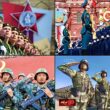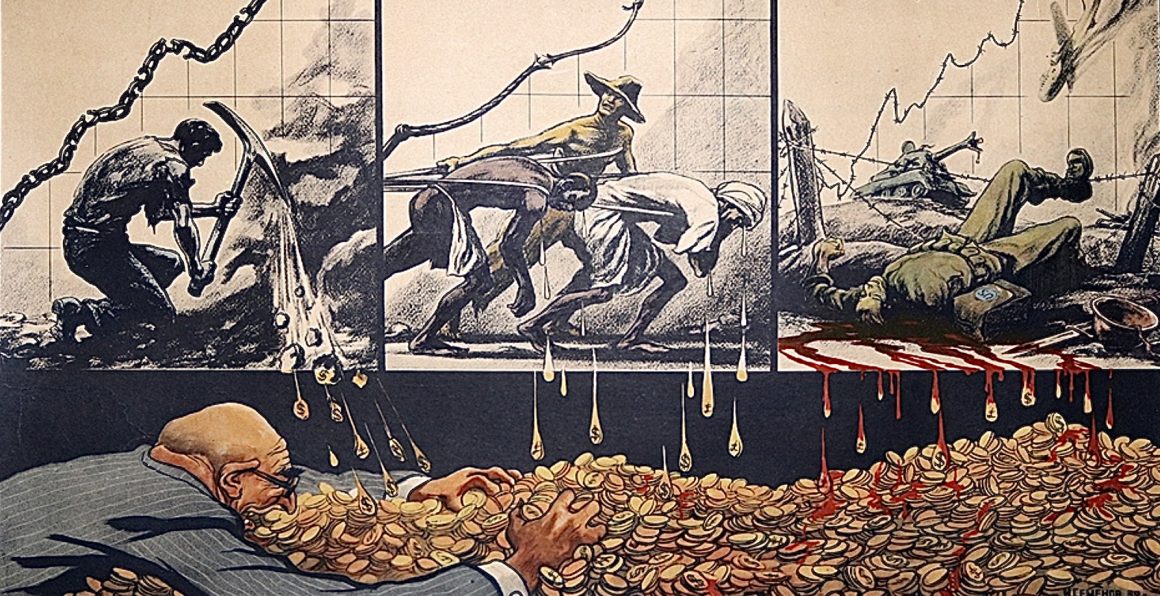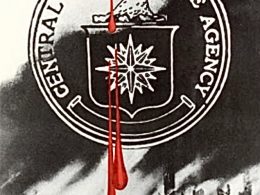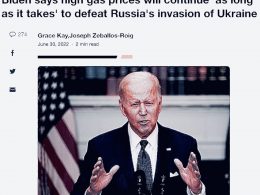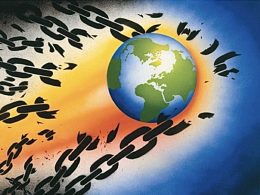When capitalism won the Cold War, it only ended up making its own collapse a speedier process. Our current era is called late-stage capitalism because it’s the period during which the bourgeoisie are no longer a rising, revolutionary force, but an outmoded relic that’s fighting against being replaced by the proletariat as the politically dominant class. During this stage, capitalism can only survive by perpetuating war. It must maintain the export of capital from the core countries to the peripheral countries, for which a ceaseless war machine is necessary. That’s what the conflict in Ukraine is about: creating a destabilizing event that the imperial powers hope will destroy Russia, allowing for a Yugoslavia-style western market takeover of the country and of broader Eurasia. This project will not just fail, but seal imperialism’s doom.
Failure to turn Russia into a sustainable client state
This use of one former Soviet state against another for imperialist crisis-manufacturing purposes was made possible by the USSR’s downfall. And I’m not just talking about Russia and Ukraine; Armenia and Azerbaijan were Soviet socialist republics as well, before their counterrevolutions let the imperialists get them to fight. The conflict between the latter two countries is in fact part of the same imperialist destabilization scheme as the one exacted upon the former two, because by facilitating Azerbaijan’s invasion, Washington has intended to divert Russia’s forces towards aiding Armenia.
The imperialists who instigated these conflicts should feel triumphant at this moment. They should feel like the last thirty years of their schemes to ravage, loot, and meddle within the former Soviet bloc are coming together to realize their end goal of colonizing Russia and then China. Such a scenario is no doubt what the imperialists envisioned after the Soviet leadership’s internal theoretical failings enabled western capital to carry out a coup across what had used to be the geographically largest socialist bastion. They should be on their way to achieving full spectrum dominance, which is to say the totally unchallengeable hegemony that Paul Wolfowitz wrote Washington must work towards achieving in the post-Soviet era:
Our first objective is to prevent the re-emergence of a new rival, either on the territory of the former Soviet Union or elsewhere, that poses a threat on the order of that posed formerly by the Soviet Union. This is a dominant consideration underlying the new regional defense strategy and requires that we endeavor to prevent any hostile power from dominating a region whose resources would, under consolidated control, be sufficient to generate global power…The U.S. must show the leadership necessary to establish and protect a new order that holds the promise of convincing potential competitors that they need not aspire to a greater role or pursue a more aggressive posture to protect their legitimate interests. In non-defense areas, we must account sufficiently for the interests of the advanced industrial nations to discourage them from challenging our leadership or seeking to overturn the established political and economic order. We must maintain the mechanism for deterring potential competitors from even aspiring to a larger regional or global role.
The reason why the present events represent not a great triumph for imperialism, but an increasingly uncertain situation for it, is that the U.S. almost immediately failed to achieve this goal of ensuring global control following the initial looting of newly capitalist Russia. The imperialists had to rely on meddling within Russia’s politics, which their media famously bragged about doing in 1996 with the forced solidification of Russia’s status as a U.S. client state. Just a few years later, this control slipped away with Putin’s coming to power, which enabled the Russian people’s mandate for the country to go on a path independent from Washington. It was this breaking away of Russia from subjugation that would let China have a great strategic partner during its economic rise, and that therefore ensured the transition towards multipolarity.
Right after Wolfowitz concluded it was indispensable for Washington to account for the interests of the advanced industrial nations so that they don’t break from imperial control, Washington failed to do exactly that in regards to Russia. Which is one of the most strategically important of these advanced nations. If Wolfowitz and his fellow foreign policy elites were serious about wanting to maintain good relationships with Russia and these other nations, they would have opposed the neoliberal shock policies that Washington immediately imposed upon the former Soviet states. Which underwent one of history’s most catastrophic drops in living standards as a consequence of this extreme corporate looting.
If they had been serious, Wolfowitz and company would have denounced the dismantling of the Soviet social safety net, the dynamiting of the Soviet educational system, and the other attacks on the livelihoods of these countries as foolish measures that jeopardized U.S. strategic interests. But they didn’t, because imperialism has contradictory goals: to exploit poorer countries, and to maintain good relationships with these countries. Shockingly, when you utterly ravage a country, tensions appear in your relationship with it. So within a decade after the shock policies began, Russia broke from imperial control.
By applying the Pinochet-style shock doctrine to Russia, the imperialists opened themselves up to being damaged by a combination of the second and third contradictions of imperialism, as described by Stalin. Stalin wrote that imperialism’s second contradiction is “the contradiction among the various financial groups and imperialist Powers in their struggle for sources of raw materials, for foreign territory.” Modern Russia is too weak in its capital to play the role of an imperialist power, but Russian capital is still monopoly capital, which makes the decision by its ruling class to break from U.S. control fit with this phenomenon of the different bourgeois factions coming to be at odds with each other.
Stalin wrote that imperialism’s third contradiction is “the contradiction between the handful of ruling, ‘civilised’ nations and the hundreds of millions of the colonial and dependent peoples of the world.” The shock policies turned Russia from the world’s second most powerful country to a subjugated semi-peripheral country, vastly diminished in its economic strength and undergoing an austerity-induced humanitarian crisis. This appalling deterioration of the Russian people’s conditions didn’t lead to a new communist revolution, but it did make clear to the Russian bourgeoisie that it was in their own best interests to stop overseeing a client state arrangement.
As an aside, Stalin described the first contradiction as “the contradiction between labour and capital,” where the strength of the bourgeois state that monopoly capitalism creates leaves the workers with no choice other than to rise up. This contradiction will in time lead to the downfall of the bourgeoisie across the imperialist bloc, who will see revolution likely before the Russian bourgeoisie do.
Capitalism inching towards its demise, both in Russia & in the imperialist countries
It’s been proven that breaking from client state control was in the Russian bourgeoisie’s best political interests, because since the beginning of Putin’s presidency, living standards have greatly improved compared to the dismal Yeltsin years. Due to this development, Russia’s internal stability has become too strong to be destroyed by imperialism’s sanctions, or by the psyops that covert NATO propaganda agents have directed towards Russia’s population. One pro-NATO columnist admitted so following the start of the proxy war this year: “After years of living in Moscow, I have bad news: No one should expect the Russian people to suddenly rise up against Putin now….Wages have risen. Average people can afford foreign cars and annual holidays to the beaches in Greece and Egypt. For years, many had little interest in rocking the boat….It is difficult to imagine Russia’s sudden global pariah status and the collapse of the economy quickly changing this dynamic.” Russians now have a comparative modicum of economic security, and will avoid the Yugoslavians people’s fate of having their country broken up into several U.S. puppet states. Truly tragic.
The only way the imperialists could have ensured Russia stayed on their side would have been to incorporate it into the list of imperialist powers, like they’ve done with south Korea. But there are only so many superprofits to go around, so the best they could hope for was to perpetually meddle in Russia’s elections so their stooges could remain in power. When this didn’t work out, they activated the former Soviet states that they’ve managed to make into vessels for proxy warfare, hoping this would bleed Russia dry. Which isn’t working either, as senior U.S. officials admitted last month: “We were expecting that things like SWIFT and all the blocking sanctions on Russia’s banks would totally crater the Russian economy and that basically, by now going into September, we’d be dealing with an economically much more weakened Russia than the one that we are dealing with.” Russia will both evade economic collapse, and succeed at demilitarizing Ukraine, which has already become too depleted in its forces to prevent the recent Donbass referendum for joining the Russian Federation.
These officials assert that Russia will still be grievously harmed in the long term, but there are countless times when U.S. intelligence officers have underestimated Washington’s adversaries out of desire to tell their superiors what they want to hear. More likely, the outcome will be somewhere in the middle between Russian economic devastation and total recovery. Russia’s bourgeoisie will continue to make the working class pay for the crisis, while Russia’s monarchists and racial nationalists will be emboldened to carry out fascist suppression of the workers movement in tandem with the anti-communist Putin regime. The reality of modern Russia’s nature as a capitalist state hinders its capacity to be resilient, and it’s also led to flaws in Russia’s Ukraine military strategy as compared to the way the USSR would likely handle a situation like this.
Russia’s communists, particularly the World War II-informed ones who helped pressure Putin into intervening in Ukraine, are most capable of combating imperialism. And the Russian people, who overwhelmingly view the Soviet era as more pleasant than the present day, are now recognizing this even more. Radio Free Europe recently lamented this in an absurd paragraph that probably won’t convince any of the Russians who know the actual history of the Stalin era: “Moscow polling station No. 151 was set up on the premises of the state Gulag History Museum, just a short stroll away from blood-curdling testimony of the crimes of Communist Soviet dictator Josef Stalin. Yet, according to official preliminary voting results, the Communist Party won the precinct with nearly 29 percent of the vote, followed by 20.3 percent for the ruling United Russia party.”
RFA asks “but does it matter?” in regard to this ongoing trend towards revitalized Russian Bolshevism, pointing to the fact that the bourgeois state won’t allow for the communists to gain power electorally: “the new Duma will present no real challenge to the Kremlin, which is now focused on the presidential election due in 2024, when Putin’s fourth term expires.” The imperialists will support Putin over communism, which they see as an even bigger threat. And they can for now console themselves with the fact that bourgeois “democracy” will always truncate the ability of the workers, in Russia and everywhere else, to gain governmental representation. But the Bolsheviks faced the same hopelessly restrictive electoral system, until they gained power anyway by smashing that system and replacing it with workers’ democracy.
If the Russian bourgeoisie hadn’t broken the country away from being a client state, they would have made the prospect of an October Revolution 2.0 far closer. But however much time they’ve bought themselves, capitalism is innately unsustainable, and in all places it trends towards declining profits in the long term. We’re seeing this most dramatically throughout the imperialist bloc, where monopoly capitalism has accumulated so much debt, is seeing its inflation accelerate so much, and has undergone such a decline in profits since World War II that one can conclude it’s now dying a natural death. Its demise will likely come before that of Russian monopoly capitalism, which is ironically in a more stable state despite its being semi-peripheral. The neo-colonies will continue to become more economically independent due to the Belt and Road Initiative, and due to their internal workers movements. Which will cut off the superprofits imperialism depends on, leading to the contraction of capital in the core and the practical necessity of proletarian revolution.
Ultimately, capitalism will die within Russia as well, despite how well it’s been able to withstand being cut off from western capital. But that won’t be because of any of Washington’s hybrid warfare tactics, which if anything have ended up strengthening Russia’s internal stability. It will be because of capitalism’s innately self-destructive nature, and because of the work of Russia’s proletarian movement. The Russia state indeed will eventually fall, just not in the way Washington wants it to. Rather than getting balkanization and a neo-colonial takeover, Russia will get socialism, which can even better fight off imperialism. Or whatever remains of imperialism by the time the Soviet Union gets restored.
An obstacle to the Soviet Union’s return has been the deradicalization of the Communist Party of the Russian Federation, the party that called for Operation Z to be undertaken. However, as class contradictions intensify during wartime and the pandemic, the CPRF’s membership is getting more radicalized, making the party more equipped to ideologically compete with ultra-leftist Russian Marxist groups like Politsturm (a hyper-sectarian organization that claims modern Russia is imperialist). This shift has been observed by RFA, again with that desire to see Russia’s bourgeois state successfully suppress the party:
Thirty-seven-year-old Moscow professor Mikhail Lobanov — who lost a single-mandate race to United Russia’s Oleg Popov, according to preliminary official figures that he disputes — could be another [potential leader]. Lobanov’s candidacy was supported by the KPRF, although he is not a party member. He sees a changing party, one that could be less amenable to the Kremlin in the long run. “The KPRF has been under pressure for the last 20 or more years,” Lobanov said of the party’s role as party of the so-called systemic opposition — ostensibly opposition parties that generally support the Kremlin in exchange for a share of the perks of power. “Some things that look in my eyes and the eyes of others like unjustifiable compromises are likely the result of this pressure. It is clear that in connection with the radicalization of the KPRF or the radicalization of its rank-and-file membership and some individual deputies, this pressure is going to increase, and repressions may be used against the organization as a whole.”
Russia will remain a stable, united federation, before transforming back into a Soviet republic in tandem with all the surrounding countries that also wish to join the next USSR. Ukraine will keep suffering from the chaos that Washington has brought upon it, being used as an increasingly worn-out weapon in a futile effort to destabilize Eurasia. So will be the case for the rest of Europe, which has willingly offered itself up to be economically sacrificed for Washington’s fruitless war. U.S. hegemony’s decline will continue to accelerate due to the blowback from the Ukraine conflict, which has solidified the Global South’s lack of support for Washington’s military adventurism. This war will break the imperialist bloc, while failing to break Russia or the rest of the pro-China bloc, whose capitalist members will in time have their counterrevolutions reversed.
The imperialists have defeated themselves, with Ukraine being the weapon of theirs that’s backfired on them. And it’s because they gained access to that weapon with the dissolution of the Soviet Union. They should have been careful what they wished for.
—————————————————————————
If you appreciate my work, I hope you become a one-time or regular donor to my Patreon account. Like most of us, I’m feeling the economic pinch during late-stage capitalism, and I need money to keep fighting for a new system that works for all of us. Go to my Patreon here.



